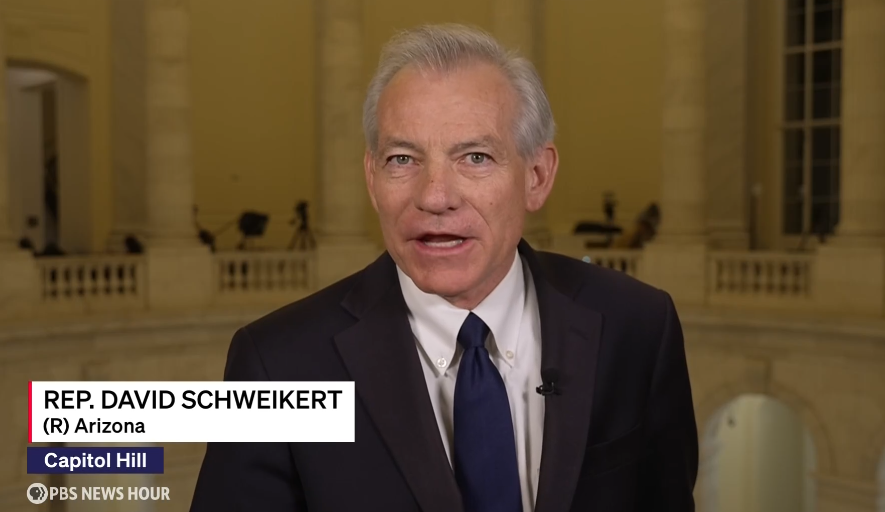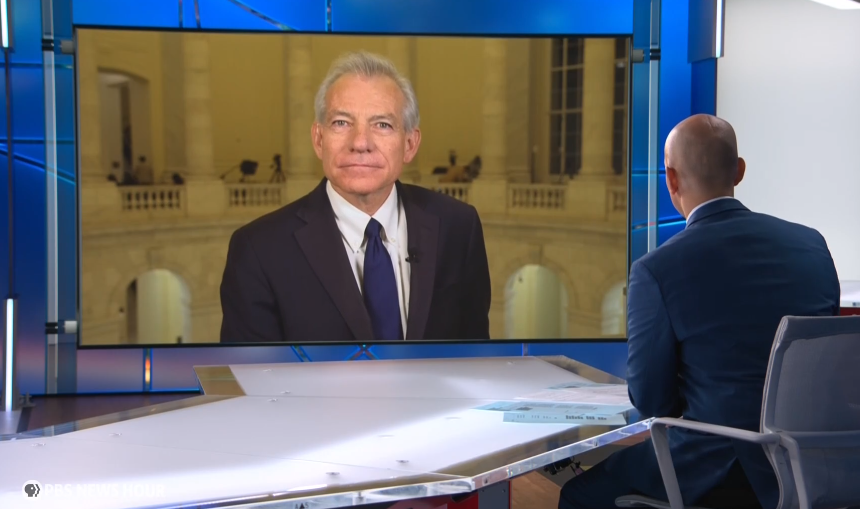The back-and-forth on the stopgap spending bill has created fault lines among House Republicans. Many were unsatisfied with the original text, but some also rejected the revised bill, which included President-elect Trump’s demands to suspend the debt limit. One of those members is Rep. David Schweikert of Arizona. He joined Geoff Bennett to discuss more.

Click here to listen to the full interview.
Read the Full Transcript
Notice: Transcripts are machine and human generated and lightly edited for accuracy. They may contain errors.
- Geoff Bennett:All right, for more insight, let’s bring in Congressman David Schweikert of Arizona, who joins us now.Congressman, thanks so much for being with us.
- Rep. David Schweikert (R-AZ): Geoff, thank you for having me. And Lisa is truly one of the very best here.
- Geoff Bennett:Well, I’d have to agree with you on that. Thanks for making note of it.So, help us understand. You opposed the first two funding bills, but you voted in support of the funding bill tonight. Why?
- Rep. David Schweikert: The debt ceiling was removed from it. For those of us — I will hopefully be chairing the Joint Economic Committee, but I’m also on Ways and Means. The opportunity to now step in and say, here’s the modernizations, here’s some of the spending reductions, those things, I now have a path to move those things forward. And let’s be honest. The previous setup on the vote had all sorts of things that I believe were Christmas-treed in, and then functionally a substantial increase in the debt ceiling with actually no understanding of that that’s a stressor around here. And we almost only do our work when there’s a stressor.
- Geoff Bennett: The version of the bill that failed last night, the bill that had the debt ceiling increase that Donald Trump supported, 38 Republicans voted against it. You were one of them. What should we take away from that? I mean, does it show the limits of Mr. Trump’s influence and power among the House GOP?
- Rep. David Schweikert: No, Geoff, I would actually take you a slightly different direction. In some ways, it was less about President Trump or even Mr. Musk. It’s the fact of the matter is we now live in a time where so far, this fiscal year — so, what, we’re 70 days into this fiscal year. We’re borrowing over $100,000 every second. It’s demographics. It’s the interest on the debt now is starting to chew us up. And it’s constantly this battle of people want things. There’s lines of lobbyists and groups in these hallways wanting things, and almost no one wants to actually talk about how we pay for it.
- Geoff Bennett:You mentioned Elon Musk. I mean, given that you are a vocal fiscal hawk, what do you make of the fact that you have this unelected multibillionaire with a number of vested interests, many would argue conflicts of interest, calling the shots on something that should be the prerogative of elected members of Congress?
- Rep. David Schweikert: I’m — actually think it’s wonderful. If you have someone with a…
- Geoff Bennett: Really?
- Rep. David Schweikert: Yes. If you have someone with a freaky high I.Q. who’s willing to, in some ways, evangelize, saying we need to modernize how we deliver health care, how we deliver government, what we do, because the fact of the matter is, intellectually, Congress, the reporting class, others, are almost fearful to tell the public just the scale. Look, we’re borrowing so far, this fiscal year $8.7 billion every single day. And yet the triteness of so many of the solutions we get, if this actually raises the profile — look, I know people want to take a shot at someone because of what they do and those things, but how much of the public actually understands we’re clicking off a trillion dollars of borrowing about every 118 days? If this actually sharpens the mind, sharpens the intellect to actually deal with the reality of our demographics, 100 percent of the debt so today through the next 10 years, is interest and health care. It’s demographics. It’s not Democrat. It’s not Republican. It’s what we are as a society.
- Geoff Bennett:I take your point about shaking up the status quo.What about the process? For Americans watching this new era of GOP control start with really chaos and manufactured crisis, you could argue, what should the American people take away from that?
- Rep. David Schweikert: In some ways — oh, God, forgive me if I’m going to say this. This is the reality when you don’t have bundles of free cash to hand out to people to buy their votes. In a previous era, when you had someone that wanted something, you say, all right, we will build that bridge. We will do that road. And that’s how you took care of their desires for their vote. Today, we don’t have that bank account to buy votes. Now we have to deal with the honor, the facts of the math, and the math will always eventually win here. So, things are going to be more difficult, but this is the reality of the avoidance of the last decade of telling the truth, what our demographics have brought us.
- Geoff Bennett:What’s your assessment of House Speaker Mike Johnson’s leadership so far?
- Rep. David Schweikert: He’s done fine. Look, building — one of the things. And, forgive me, I might be a bit pathological optimistic here. One of what we went through in the last 36 hours was building a rhythm of, how do you deal with very difficult math when you have only one- or two-vote margin and build the model of, how do you listen to people? Someone like me is from a very well-educated district. I represent the Phoenix-Scottsdale area, compared to someone that may have a rural district or other districts that haven’t had the same opportunity as my population.
- Geoff Bennett: There are lots of educated people in rural areas, but I…
- Rep. David Schweikert: No, no. Yes, but the point is, we all come with different desires. If you actually take a look at some of the no-votes, it was more — we wanted more aid for what’s happening in agricultural America. You had others that it’s an issue of what’s happening in the middle of the country compared to the coasts. So, we have got to be very careful that this isn’t populist versus conservatives versus liberals, that it’s an understanding that the movement of how we vote is actually much more complex.
- Geoff Bennett:Congressman David Schweikert of Arizona, thanks for your time this evening. We appreciate it.
- Rep. David Schweikert:Thank you for having me.


